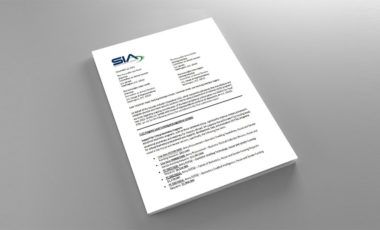Posts Tagged ‘Legislation’
Support Letter for FY22 National Defense Authorization Act
SIA circulated a support letter to members of Congress that encouraged lawmakers to approve the recommended funding levels put forth by members of the armed services committees.
Keep Reading »
What the Infrastructure Investment and Jobs Act Means for Security and Life Safety Companies
Dear Security Industry Association (SIA) members, On Nov. 15, President Biden signed the Infrastructure Investment and Jobs Act into law. This infrastructure bill is the most significant U.S. investment in infrastructure in decades and includes $550 billion in funding far above baseline for many existing highway, transit, rail and other programs. SIA commends the president…
Keep Reading »Congress Passes Bill Requiring FCC to Limit New Authorizations for Chinese Equipment, Prohibiting Revocation
Updated Oct. 29, 2021 On Oct. 20, 2021, the U.S. House of Representatives passed H.R. 3919, the Secure Equipment Act of 2021, in a nearly unanimous vote. The bipartisan legislation introduced by Reps. Steve Scalise (R-La.) and Anna Eshoo (D-Calif.,) would require the Federal Communications Commission (FCC) to adopt rules it recently proposed prohibiting “equipment…
Keep Reading »Security Industry Association Opposes Reintroduction of Facial Recognition & Biometric Technology Moratorium Act
The legislation would impose an unnecessary blanket ban and prevent government from leveraging the proven benefits of biometric and related image analytics. SILVER SPRING, Md. – The Security Industry Association (SIA) – the leading trade association representing security solutions providers – has announced its strong opposition to the Facial Recognition and Biometric Technology Moratorium Act, originally…
Keep Reading »Coalition White House Letter Opposing a Blanket Moratorium on Facial Recognition
SIA joined the U.S. Chamber of Commerce and a group of other associations in sending a letter to President Biden expressing concern with blanket moratoriums on facial recognition and advocating for a combination of technological safeguards and policy measures to effectively mitigate any risks associated with the technology and ensure that it is developed and used responsibly.
Keep Reading »Security Industry Association Applauds Senate Passage and Prioritization of U.S. Innovation and Competition Act
The bipartisan bill promotes U.S. leadership in technological advancements, including biometrics, artificial intelligence and robotics. SILVER SPRING, Md. – The Security Industry Association (SIA) commends the U.S. Senate for its passage of the U.S. Innovation and Competition Act (S. 1260), which significantly increases investment in research and development, education and training, supply chain security and the…
Keep Reading »SIA Supports Tech Innovation-Focused Endless Frontier Act
Bipartisan Bill Promotes Continued U.S. Leadership in Technological Advancements SILVER SPRING, MD – The Security Industry Association (SIA) is pleased to announce its full endorsement of the Endless Frontier Act (S.1260), bipartisan legislation introduced by Senate Majority Leader Schumer (D- N.Y.) and Sen. Todd Young (R- Ind.). The Endless Frontier Act significantly increases investment in…
Keep Reading »Why a Uniform Privacy Law Would Be Good for the Security Industry
Compliance costs are a drag on profitability for all businesses, and security companies are no exception. As privacy laws are enacted on a state-by-state basis, complying with them will introduce new costs for all of us. As troubling are efforts to ban some of the technologies many security conscious organizations, including law enforcement, are using…
Keep Reading »Multi-Association Letter Supporting CHIPS for America Act Funding
In light of the global chip shortage, SIA joined a coalition of organizations in urging Congress to support President Biden’s $50 billion funding request for the CHIPS for America Act.
Keep Reading »SIA Supports EAGLES Act School Violence Prevention Bill
On Feb. 23, Congress introduced S. 495, the EAGLES Act of 2021, a safe school initiative with bipartisan support named for the Marjory Stoneman Douglas High School mascot. The EAGLES Act would establish a national program on targeted school violence prevention and provide additional resources to expand research and training on a national scale. The…
Keep Reading »








